Un tribunal susține că serviciul de informații rus l-a angajat pe cetățeanul moldovean și l-a trimis în Estonia pentru a comite atacul.
Sursa: EuroNews

Un tribunal susține că serviciul de informații rus l-a angajat pe cetățeanul moldovean și l-a trimis în Estonia pentru a comite atacul.
Sursa: EuroNews
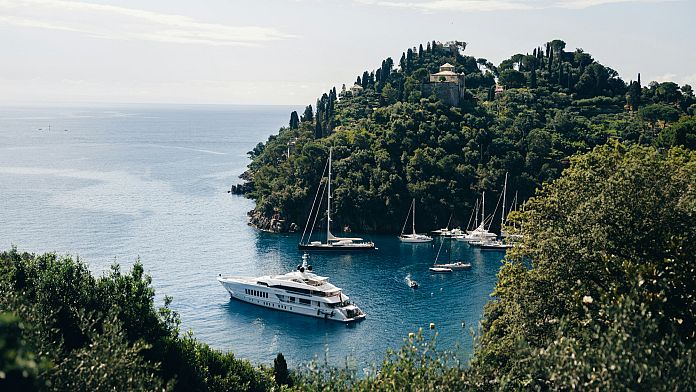
Călătorii care doresc să călătorească responsabil în croazieră nu trebuie să evite destinațiile cu restricții sau taxe.
Sursa: EuroNews
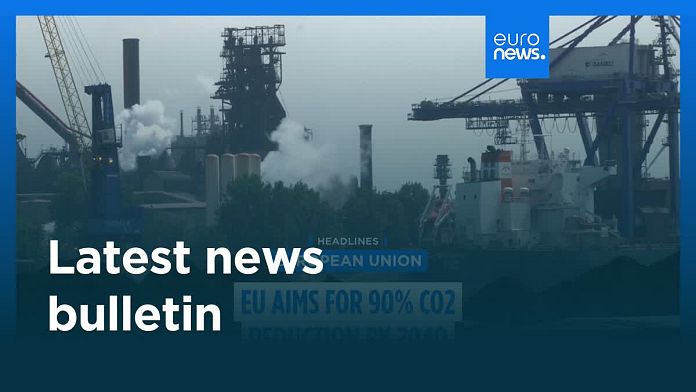
Actualizat: 03/07/2025 – 7:00 GMT+2
… Mai multe
Se redă acumUrmătorul
Se redă acumUrmătorul
Se redă acumUrmătorul
Se redă acumUrmătorul
Se redă acumUrmătorul
Se redă acumUrmătorul
Se redă acumUrmătorul
Se redă acumUrmătorul
Acum se redăUrmătorul
Acum se redăUrmătorul
Acum se redăUrmătorul
Acum se redăUrmătorul
Se redă acumUrmătorul
Se redă acumUrmătorul
Se redă acumUrmătorul
Mai multe videoclipuriFără comentarii
Fără comentarii
Știri europene
Gaza
Știri europene
SUA
Știri din Europa
UE Decoded
Toate videoclipurile
Sursa: EuroNews

În Franța, Germania și Spania, majoritatea respondenților la un sondaj doresc o aplicare mai strictă a reglementărilor digitale ale UE privind marile companii tehnologice. – Copyright Don Ryan/Copyright 2022 The AP. Toate drepturile rezervate. Copyright Don Ryan/Copyright 2022 The AP. Toate drepturile rezervate. De Peggy Corlin Publicat pe 03/07/2025 – 7:20 GMT+2 Actualizat la 7:36 Distribuiți acest articol Comentarii Facebook Twitter Flipboard Trimiteți Reddit Linkedin Messenger Telegram VKBluesky Threads WhatsApp Copiați/lipiți linkul de încorporare al videoclipului articolului de mai jos: Copiat Participanții francezi, germani și spanioli la un sondaj YouGov au solicitat o aplicare mai strictă la nivelul UE a reglementărilor digitale și consideră că marile companii tehnologice sunt mai puternice decât UE.
Majoritatea cetățenilor francezi, spanioli și germani doresc o aplicare mai strictă la nivelul UE a legilor Big Tech, conform unui nou sondaj YouGov.
Aproape două treimi din Franța (63%), 59% din Germania și 49% din Spania au declarat că aplicarea la nivelul UE a legilor care abordează influența și puterea Big Tech este prea relaxată, atunci când li s-a cerut să aleagă între prea relaxată, prea strictă sau aproximativ corectă.
Doar 7% dintre respondenții din Franța, 8% din Germania și 9% din Spania au considerat că aplicarea este prea strictă.
Sondajul, comandat de două ONG-uri – People vs Big Tech și WeMove Europe – vine în urma adoptării de către UE în 2022 a Legii privind serviciile digitale (DSA) și a Legii privind piețele digitale (DMA), care vizează reglementarea impactului giganților tehnologici asupra utilizatorilor și a pieței.
Ambele reglementări sunt prinse în disputa comercială dintre UE și SUA, în care SUA au descris DSA și DMA ca fiind netarifare nejustificate. bariere.
Comisarul UE pentru concurență, Teresa Ribera, a declarat săptămâna trecută pentru Euronews că UE nu va ceda presiunilor SUA pe această temă.
„Ne vom apăra suveranitatea”, a spus Ribera, adăugând: „Vom apăra modul în care ne implementăm regulile, vom apăra o piață funcțională și nu vom permite nimănui să ne spună ce să facem.”
În mod surprinzător, rezultatele sondajului arată, de asemenea, că participanții la sondaj au considerat că marile companii tehnologice dețin mai multă putere decât UE însăși.
Jumătate dintre respondenții francezi (50%), 48% în Germania și o majoritate în Spania (55%) consideră că marile companii tehnologice sunt „mai puternice” sau „puțin mai puternice” decât UE. În schimb, doar 9% în Franța, 12% în Germania și 15% în Spania consideră că giganții tehnologici sunt „puțin mai puțin puternici” sau „mult mai puțin puternici”.
Sondajul a fost realizat pe un eșantion de 2.070 de respondenți în Franța, 2.323 în Germania și 2.077 în Spania.
Accesați comenzile rapide de accesibilitateDistribuiți acest articolComentarii
1
2
3
4
5
Sursa: EuroNews

Parlamentul UE ar putea evalua ancheta Parchetului European privind o presupusă schemă de fraudă organizată care implică fonduri agricole și corupție.
Sursa: EuroNews
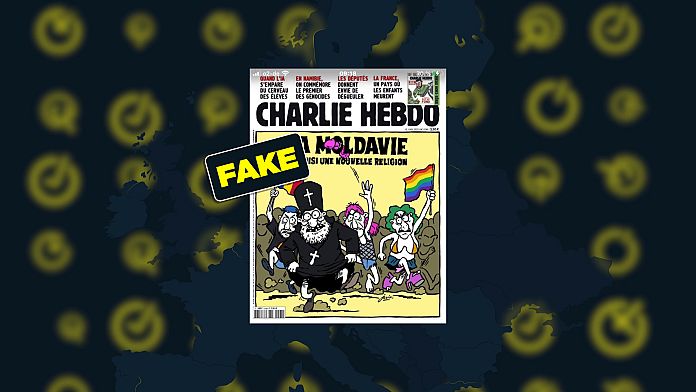
Copertele false atribuite revistei satirice franceze sunt frecvent folosite ca vectori pentru dezinformare.
Sursa: EuroNews
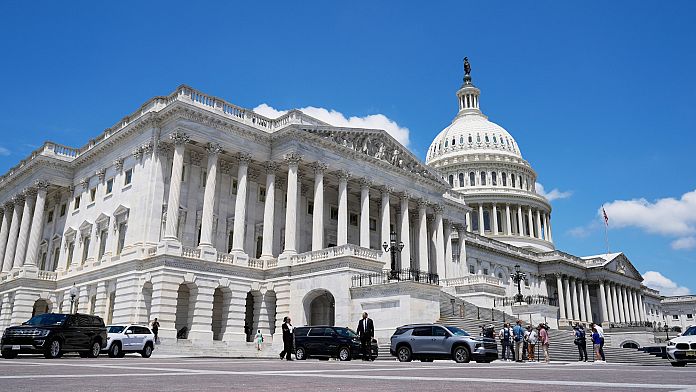
1
2
3
4
5
Sursa: EuroNews
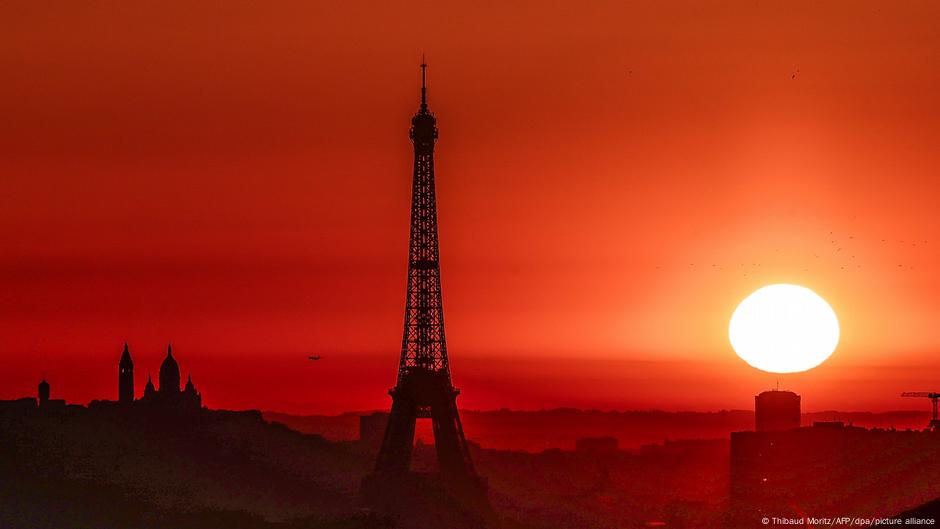
Nature and EnvironmentEurope
Anchal Vohra in Brussels07/02/2025July 2, 2025
https://p.dw.com/p/4wpIWA decade after the Paris climate accord, the European Commission has proposed that the bloc reduce its net greenhouse gas emissions 90% by 2040Image: Thibaud Moritz/AFP/dpa/picture alliance
With large parts of Europe gripped in a record-breaking heat wave, the European Commission has proposed that the bloc reduce its net greenhouse gas emissions 90% by 2040. That’s in comparison to levels back in 1990, and on track to meet the target of net-zero emissions by 2050.
The binding emissions reduction target was first proposed last year, and came after months of tough negotiations among member states. The existing target requires the EU to reduce net emissions by at least 55% by 2030; in May, the Commission said the bloc had already cut climate-warming emissions by 37%.
The new target will give certainty to investors, “strengthen industrial leadership of our businesses, and increase Europe’s energy security,” the commission said in a statement on Wednesday.
But not all member states are on board with the plan, and a controversial flexibility clause on buying carbon credits on international markets has activists crying foul.
Europeans have been suffering through a brutal heat wave, with temperatures in the high 30sImage: Thomas Coex/AFP
Under the proposal, EU member states could purchase international carbon credits on green projects in third countries from 2036 onward, using them to offset up to 3% of the benchmark 1990 emissions.
“This can provide a safety-net to ensure a 90% target is achievable as we are closing on climate neutrality,” the commission said.
But climate activists have said the flexibility clause was included due to pressure from member states like France and Germany, along with major industry lobbyists, at the cost of reduced investments at home.
To view this video please enable JavaScript, and consider upgrading to a web browser that supports HTML5 video
Mathieu Mal, a climate and agriculture expert at the European Environment Bureau, said the 3% flexibility clause was a “bad idea” for a variety of reasons.
“What this means is that the EU would be investing in other countries outside the bloc to reduce their emissions, and that’s problematic because we need these investments within the EU. We also have our sectors to decarbonize and we need funds for energy transformation here,” he said.
“Every country across the world needs to commit to climate action. If the EU counts these carbon credits towards its own goals, then what about the countries who also need to reduce their emissions and achieve their own targets?”
Critics worry that outsourcing carbon credits to countries like India, which struggle with their own environmental problems, will dilute EU efforts to reduce emissionsImage: Sakib Ali/Hindustan Times/Sipa USA/picture alliance
In May, the European Scientific Advisory Board on Climate Change advised against outsourcing part of the bloc’s climate efforts, saying it “risk[s] diverting resources from domestic investments and could undermine environmental integrity.” It called on all reduction toward net zero to be “achieved through domestic action.”
Critics of the clause have called it a ruse for heavy polluters who find it cost intensive to decarbonize in Europe and easier to invest in projects abroad that lack sufficient oversight.
“The use of carbon credits is simply magical thinking for a bloc unwilling to live up to its responsibility for causing the climate catastrophe we’re already living through,” said Friends of the Earth Europe. “Carbon credits have a long record of failure and ultimately do not stop Europe emitting more than its fair share of carbon emissions.”
Speaking with DW, Mal highlighted previous concerns about green investments in third nations. “There have been lots of issues in the past. Projects carried out in some countries often don’t have high standards, they often remain just on paper. There are questions if they were ever materialized,” he said.
To view this video please enable JavaScript, and consider upgrading to a web browser that supports HTML5 video
The Commission’s new target has the backing of at least some of the EU member states.
As Denmark takes over the EU’s rotating presidency this week, it has listed the 2040 target as one of its top priorities. “Anyone who says that the green transformation cannot be achieved with high ambition and social justice at the same time should come to Denmark,” said Villy Sövndal, a lawmaker with the European Greens group and Denmark’s former foreign minister.
“Competitiveness in the 21st century is not linked to fossil fuels but to the advancement of the energy transition,” Pedro Sanchez, Spain’s socialist prime minister, said last week at the EU summit in Brussels.
But other countries consider the 2040 target to be too ambitious. Italy has said an 80-85% target for 2040 would be more realistic, and the Czech Republic said Wednesday it disagreed with the commission’s proposal.
Speaking at the EU summit, French President Emmanuel Macron also indicated it was still too early to agree to setting the target for 2040. “The reality is that I want to get my 2030 target right first,” he said, “and take the democratic and political time to convince others to get to 2040.”
While Germany and France both back the 3% flexibility clause, France expects an even higher percentage of the overall goal to be met by purchasing international carbon credits, with some reports suggesting up to 10%.
The European Commission’s green transition chief, Teresa Ribera, has warned against watering down the bloc’s climate ambitions. Image: Kamran Jebreili/AP Photo/picture alliance
According to Teresa Ribera, the EU’s green transition chief, some political groups in the EU continue to deny climate change whereas others lack courage in confronting their constituents about steps required to combat the problem.
“Political courage is needed to understand that there is a difficulty,” she said in an interview with The Guardian on Wednesday. “You need to face it with honesty.”
The EU’s climate plans have raised concerns around the costs of green transition and disruption to industrial growth and livelihood, if decarbonization is carried out without adequate support. However, Ribera believes there is no time to waste.
“Sorry, but it’ll be much more expensive if we don’t act,” she said.
A Eurobarometer survey released this week showed that 85% of Europeans believe climate change is a serious problem and tackling it should be a priority, while 77% agreed that the cost of damage due to climate change is much higher than the investment needed for a net-zero transition.
“As European citizens increasingly feel the impact of climate change, they expect Europe to act,” European Commission President Ursula von der Leyen said on Wednesday.
The proposal still needs the stamp of approval from the European Parliament and member states, and Climate Commissioner Wopke Hoekstra said he hoped an agreement could be reached before the UN climate change conference in Brazil in November. But time is short, and there are still doubts as to whether the proposal in its current form will be adopted as law.
Edited by: Martin Kuebler
Anchal Vohra Brussels-based European correspondentSend us your feedback
Sursa: DW
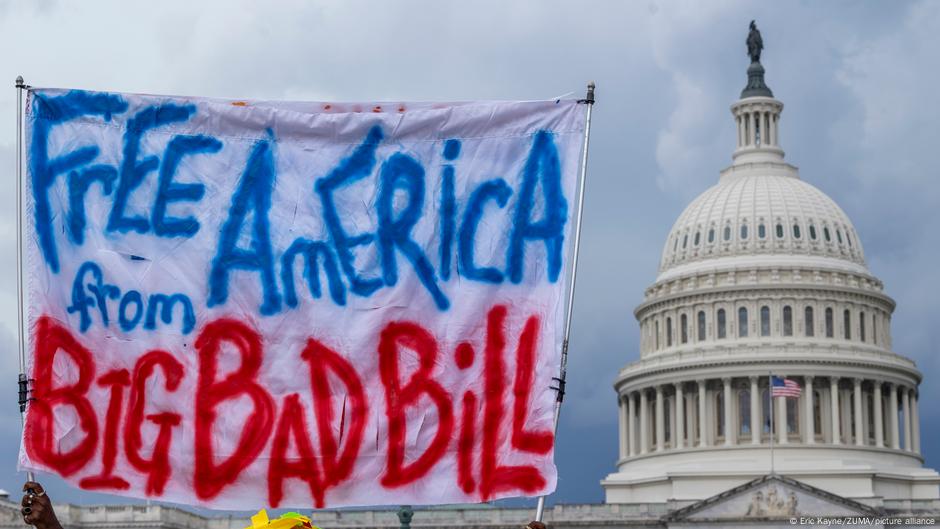
PoliticsUnited States of America
Matthew Ward Agius07/02/2025July 2, 2025
https://p.dw.com/p/4wmrGPresident Donald Trump’s bill is highly contentious and has inspired protesters to take to the streets of WashingtonImage: Eric Kayne/ZUMA/picture alliance
Donald Trump’s “One Big Beautiful Bill Act” has passed the US Senate and now only needs to be sent to his desk by the Republican-controlled House to be signed into law.
It means the US president, who has long pressured Republicans to pass the bill, is now on the brink of an important legislative milestone and political victory.
Much of his second term has so far been marked by executive orders, which are presidential instructions with the force of laws but which don’t need the approval of Congress. But having this major spending and tax bill passed by Congress will finance a huge chunk of his presidential campaign promises.
“I think, politically, this is a winner for Donald Trump, he can point to some sort of legislative success for his agenda,” said Steven Webster, a political scientist at Indiana University in Bloomington.
Trump has demanded the House pass the bill for him to sign by July 4 — suggesting his desire for an Independence Day themed victory lap — but there are still hurdles to overcome within his own party.
Mike Johnson has committed to passing the revised ‘One Big Beautiful Bill Act’ through the House of Representatives by July 4, but may face some challenges from within his own partyImage: Kevin Dietsch/Getty Images
“Some people dislike the bill because of the cuts to part of the American health care and safety net system,” said Peter Loge, a political analyst at George Washington University in Washington, D.C.
“Some people don’t like the legislation because it adds a tremendous amount to the US debt. It’s incredibly expensive.”
The big bill is a big attempt to check off Trump’s long list of campaign promises.
It includes a mix of individual and business tax cuts, massive cash injections to immigration controls, increased military spending and a ramping up of fossil fuel incentives.
There are also changes to health and social program eligibility and a winding down of some of the climate transition initiatives introduced by former President Joe Biden.
The winners, unsurprisingly, are policy realms that have been the foundation of Trump’s “America First” mantra.
A total of in spending will go to programs intended to restrict immigration, including resuming the construction of Trump’s Mexico border wall, as well as to staff and resource border police, immigration prosecutions, detention and criminal investigations.
Around — a call for fossil fuel extraction to be ramped up — the bill would simultaneously incentivize gas exploration and exports, while ending concessions and incentives for electric vehicles, clean energy and emissions reduction programs.
To view this video please enable JavaScript, and consider upgrading to a web browser that supports HTML5 video
There also tax cuts of about
“Nothing in this bill should be surprising,” Loge said, “It promises to spend a lot of money capturing immigration concerns in the US… it would spent a huge amount of money strengthening our immigration system and finding and deporting people who are here without proper authorization. That’s by-and-large popular among many people.”
In both houses, Republican leaders have been forced to balance the demands of holdouts — those unhappy with the measures contained within the bill.
Debt is a major concern for fiscal conservatives. Nonpartisan analysts project about of the bill. The debt limit has been raised by
Prior to the Senate passing the bill, the world’s richest person and the top donor to Trump’s presidential campaign threatened to run candidates against Republicans who supported the measures during upcoming primary contests, and went as far to suggest he’d start his own “America Party” in opposition.
“I think the party is likely to struggle to explain how adding three-and-a-half trillion dollars to the national debt is in line with their stated goal of getting the nation’s fiscal house in order,” said Webster.
The bill is also unpopular with the public.
According to a Quinnipiac University poll from mid-June, 53% of Americans support the bill and 27% don’t (the rest didn’t offer an opinion). Only two-thirds of Republican voters are in favor. Analysts DW spoke with said that when the content of the bill tends to be explained to voters, including Republicans, support declines.
To view this video please enable JavaScript, and consider upgrading to a web browser that supports HTML5 video
Changes to health and social programs likely play a major role.
New eligibility rules, particularly for the Medicaid scheme which extends health care coverage to low-income people, and the SNAP food aid program could see millions of people lose health insurance coverage by 2034, according to the independent Congressional Budget Office. In all, more than have been cut from health measures.
“It’s about 17 million that would lose coverage,” said Elisabeth Wright Burak, a senior fellow at the Georgetown University Center for Children and Families, a nonpartisan research center.
“Even if there are some sort of tax or other benefits, if you’re losing your health insurance coverage, or you’re losing your nutrition assistance, that’s a hit to your [personal] bottom line.”
That could also hit important parts of Trump’s MAGA base — including working Americans who have flipped their support to him during the last decade.
While many of the health program changes have been made because of what Trump has called large scale “fraud and abuse” within the US public health infrastructure, many experts have argued the claimed attempt to cut fat from health care initiatives is hacking into muscle.
“There’s not a lot of fat in Medicaid,” said Wright Burak. “Certainly there are things that could be improved, but most of that money is already going to health care services.”
Trump is expected to take a major hand in final negotiations with the Republican House representatives. According to The Associated Press, he has already met with moderate Republicans and is set to do the same with the conservative caucus.
Edited by: Martin Kuebler
Matthew Ward Agius Journalist reporting on politics, health, history, science, climate and environment.Send us your feedback
Sursa: DW

SportsEurope
Karl Sexton cu Reuters, dpa07/02/20252 iulie 2025
https://p.dw.com/p/4wphQO forță istorică, Norvegia a avut dificultăți în ultimii aniImagine: Geir Olsen/NTB/IMAGO
Norvegia a revenit după un gol în urmă și a învins gazda, Elveția, cu 2-1, în meciul de deschidere al turneului de fotbal feminin Euro 2025, miercuri seară.
Elveția, care a început strălucit în fața unui St. Publicul de pe Jakob-Park conducea la pauză prin golul lui Nadine Riesen din minutul 28, care a intrat pe bară.
Dar Norvegia, câștigătoare a Cupei Mondiale din 1995, a marcat de două ori în cinci minute, împiedicând elvețienii să aibă un start de basm în turneul lor de acasă.
Atacantul vedetă norvegiană, Ada Hegerberg, a înscris cu capul, dintr-un corner, după minutul 54, înainte ca un autogol al Julia Stierli, cinci minute mai târziu, să completeze revenirea scorului.
Hegerberg, unul dintre cei mai buni atacanți din lume, s-a ridicat la coș pentru a egala scorul. Imagine: Michael Buholzer/Keystone/dpa/picture alliance
Miercuri mai devreme, echipele din Grupa A, Islanda și Finlanda, au deschis competiția în orașul Thun, finlandezii câștigând cu 1-0 datorită unui gol al Katariinei Kosola din minutul 70.
Șaisprezece echipe concurează în opt orașe – Basel, Berna, Geneva, Lucerna, Sion, St. Gallen, Thun și Zurich — în cadrul campionatului care durează o lună și care se desfășoară până pe 27 iulie.
Finala va avea loc pe 27 iulie la St. Jakob-Park, cel mai mare stadion din Elveția, din Basel.
Finalistele Cupei Mondiale, Spania și Anglia, sunt considerate pe scară largă două dintre principalele pretendente la coroană.
Leoaicele Angliei sunt campioanele en-titre, câștigând primul titlu major al națiunii de când echipa masculină a câștigat Cupa Mondială în 1966.
Victoria lor istorică la Campionatul European a venit în 2022, după ce turneul a fost amânat din cauza pandemiei. Au ajuns în finala Cupei Mondiale din 2023, dar au fost eliminati de Spania.
Germania, o altă forță, va încerca să-și recâștige dominația. După ce a pierdut în fața Angliei în prelungiri în finala din 2022, Germania va încerca să-și completeze remarcabilul palmares de șase titluri europene consecutive din 1995 până în 2013.
Echipa feminină a Germaniei a câștigat opt din cele 13 finale europene în total și deține și două trofee de Cupă Mondială.
Turneul a început în timp ce Europa se coacea sub așa-numita „cupolă de căldură”, temperaturile record lovind și Elveția. Imagine: Nick Potts/empics/picture alliance
Femeile conduc acum șapte dintre cele 16 echipe care concurează la Euro 2025 – adică 43,75% – o creștere bruscă de la doar 18,75% la Euro 2013. Proporția aproape s-a dublat până în 2017 și s-a îmbunătățit constant de atunci, ajungând la 37,5% la turneul din 2022.
În ciuda progreselor, antrenorii bărbați au încă un ușor avantaj numeric la Campionatul European din acest an.
Succesul nu a fost un obstacol pentru femeile aflate în funcții de conducere. Între 2000 și Cupa Mondială Feminină din 2023, fiecare turneu internațional major de fotbal feminin – Cupa Mondială, Campionatul European și Jocurile Olimpice – a fost câștigat de o echipă antrenată de o femeie, cu excepția victoriei Japoniei la Cupa Mondială din 2011 sub conducerea lui Norio Sasaki, singurul antrenor bărbat care a întrerupt această tendință.
Turneul a început în timp ce Europa se ardea sub o așa-numită „dom de căldură”, pe fondul temperaturilor record pe întreg continentul și al avertizărilor de vreme caniculară în multe zone.
UEFA a relaxat regulile de securitate ale stadioanelor, astfel încât fanii să poată aduce sticle de apă de jumătate de litru pe fondul unui val de căldură care lovește anumite părți ale Elveției, cu temperaturi care ajung în jur de 35 de grade Celsius (95° Fahrenheit). Pauzele de relaxare pot fi folosite, dacă este necesar, în timpul jocurilor.
Editat de Jenipher Camino Gonzalez
Karl Sexton Scriitor și editor specializat în actualitate internaționalăTrimiteți-ne feedback-ul dvs.
Sursa: DW